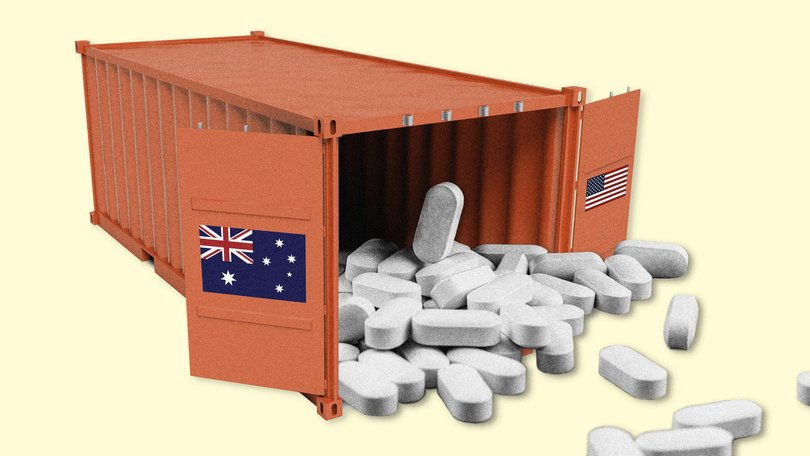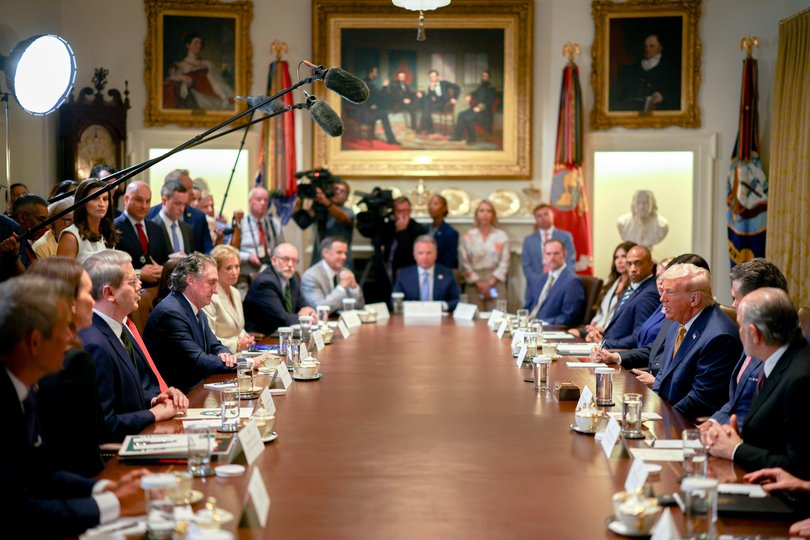Albanese Government scrambling after Donald Trump’s ‘unwelcome’ 200pc pharmaceutical & 50pc copper tariffs
Treasurer Jim Chalmers says Donald Trump’s evolving tariffs regime are injecting an ‘unnecessary element of uncertainty, unpredictability and volatility in the global economy’.

Treasurer Jim Chalmers says Donald Trump’s evolving tariffs regime are injecting an “unnecessary element of uncertainty, unpredictability and volatility in the global economy”.
The Government is scrambling to confirm what impact the US President’s latest tariff proposal will have on $2.1 billion worth of annual pharmaceutical exports, after Mr Trump threatened overnight to hit goods with duties of up to 200 per cent.
In the latest instance of the President’s ad-hoc approach to his trade agenda, Mr Trump revealed to journalists at the opening of a cabinet meeting that he was considering imposing new tariffs of “a very, very high rate, like 200 per cent” on pharmaceutical imports, which he said wouldn’t come into effect for another 12-18 months.
Sign up to The Nightly's newsletters.
Get the first look at the digital newspaper, curated daily stories and breaking headlines delivered to your inbox.
By continuing you agree to our Terms and Privacy Policy.Commerce Secretary Howard Lutnick said after the meeting that details on those tariffs would come at the end of the month, when his section 232 investigation is concluded.
In the same spray, the President announced plans to slap 50 per cent of tariffs on copper imports, which would come into effect sooner.
While only around one per cent of Australian copper exports go to the US, the American market accounts for about 40 per cent of our pharmaceuticals.
A few hours after Mr Trump made the announcement, Treasurer Jim Chalmers said the latest development was “very concerning” and the Australian Government was urgently seeking more detail.
“Our pharmaceutical industry is much more exposed to the US market. And that’s why we’re seeking — urgently seeking — some more detail on what’s been announced,” Dr Chalmers said on radio.
A short time later Government sources indicated they weren’t overly concerned about the President’s latest declaration.
By Wednesday afternoon, even after officials had reached out to their counterparts and the Government had spoken to exporters, Dr Chalmers’ said the Government was “still seeking more information about the application of these proposed tariffs”.
Describing the tariffs as “unwelcome”, Dr Chalmers said he hadn’t “had the opportunity to speak” with his direct counterpart, but that engagement with the administration is ongoing at different levels.
“When it comes to pharmaceuticals, the President said that there’s a period of time that he would be considering this potential step, and so that gives us the opportunity to properly understand what it means for our workers, our businesses, our exporters and our investors,” he said.
But he noted the extra element of unpredictability comes “at a very unwelcome time” with so much uncertainty already in the global economy.
“We are better placed and better prepared to deal with that uncertainty, but we’re not immune from it,” he said.
It comes just hours after the Reserve Bank of Australia opted to keep interest rates steady yesterday, citing global uncertainty as a major factor.
Shadow trade minister Kevin Hogan said if the latest tariffs do eventuate, it would be a “serious escalation”, and accused Prime Minister Anthony Albanese of not doing enough to prioritise Australia’s relationship with the US.
“This should have been raised at the highest levels months ago. It is frankly embarrassing that our Prime Minister has still not secured a meeting with President Trump,” he said.

“This is a critical relationship that needs urgent attention. The Prime Minister must act before more damage is done to Australia’s export economy.”
His government counterpart, Trade Minister Don Farrell, is on leave.
Dr Chalmers said the Government engaged “at almost every level, more or less continuously on these issues” and was conscious of the impact it was having on exporters.
“Obviously, from day to day, there are new developments,” he said.
Since coming to office, Mr Trump has made numerous announcements on the fly about tariffs, which have subsequently been walked back, paused or scaled down. His “liberation day” tariffs have been paused again, not coming into effect until August 1 to give the Administration more time to finalise deals.
After he exempted drugs from his first term tariffs, the powerful US pharmaceutical lobby has this time around been pushing the President to punish Australia for its Pharmaceutical Benefits Scheme.
The $17b scheme allows Australians to purchase life-saving drugs worth thousands of dollars for as little as $31.60, or $7.70 for concession card holders. Costs are kept low because the Government negotiates with the drug company.
American big pharma has labelled the system as “socialised medicine”, and peak lobby group the Pharmaceutical Research and Manufacturers of America in March described the PBS as an “egregious and discriminatory” threat to market competitiveness.
In an op-ed penned by the group’s president and chief executive last week, Stephen J Ubl called on President Trump to “reject foreign price control models that ration care and suppress innovation”.
Dr Chalmers on Wednesday said the PBS was not on the negotiating table.
“This Albanese Labor Government is about strengthening the PBS in the interests of our people, not weakening it in the interests of American multinationals. We’ve made that clear on a number of occasions,” he said.
The Trump Administration in April launched investigations into pharmaceutical and copper imports as part of their bid to impose tariffs on both sectors on national security grounds.
According to the Australian Bureau of Statistics, of the $2.1b of medicinal and pharmaceutical products exported in 2024 to the US, 87 per cent were Antisera, an immunological product extracted from blood and used in medical testing and treatment. Since January 2020, 80 per cent of Australia’s Antisera exports were to the USA.
However Australian pharmaceuticals only account for one per cent of US imports in 2023, according to the US Census Bureau. The European Union meanwhile accounted for 62 per cent — 25 per cent of which came just from Ireland. The EU accounted for 72 per cent of blood and antisera imports.

